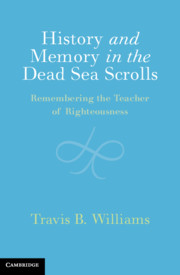
-
Select format
-
- Publisher:
- Cambridge University Press
- Publication date:
- May 2019
- May 2019
- ISBN:
- 9781108681285
- 9781108493338
- Dimensions:
- (228 x 152 mm)
- Weight & Pages:
- 0.79kg, 458 Pages
- Dimensions:
- Weight & Pages:
You may already have access via personal or institutional login
Book description
The nature and reliability of the ancient sources are among the most important issues in the scholarship on the Dead Sea Scrolls. It is noteworthy, therefore, that scholars have grown increasingly skeptical about the value of these materials for reconstructing the life of the Teacher of Righteousness. Travis B. Williams' study is designed to address this new perspective and its implications for historical inquiry. He offers an important corrective to popular conceptions of history and memory by introducing memory theory as a means of informing historical investigation. Charting a new methodological course in Dead Sea Scrolls research, Williams reveals that properly representing the past requires an explanation of how the mnemonic evidence found in the relevant sources could have developed from a historical progression that began with the Teacher. His book represents the first attempt in Dead Sea Scrolls scholarship to integrate history and memory in a comprehensive way.
Reviews
‘Williams provides a welcome advancement of my own and others’ past work on the Teacher.’
Jutta Jokiranta Source: Dead Sea Discoveries
‘… this more sustained application of memory theory to the scrolls is a welcome undertaking which certainly invites further discussion.’
Matthew A. Collins Source: Religious Studies Review
‘Williams’ introduction of memory theory provides an alternative to historical positivism and pessimism in the study of the Teacher, while opening up new ways of engaging the Scrolls as sources of historical information.’
Rebecca Harris Source: Revue de Qumrân
Contents
Metrics
Altmetric attention score
Full text views
Full text views help Loading metrics...
Loading metrics...
* Views captured on Cambridge Core between #date#. This data will be updated every 24 hours.
Usage data cannot currently be displayed.
Accessibility standard: Unknown
Why this information is here
This section outlines the accessibility features of this content - including support for screen readers, full keyboard navigation and high-contrast display options. This may not be relevant for you.
Accessibility Information
Accessibility compliance for the PDF of this book is currently unknown and may be updated in the future.


